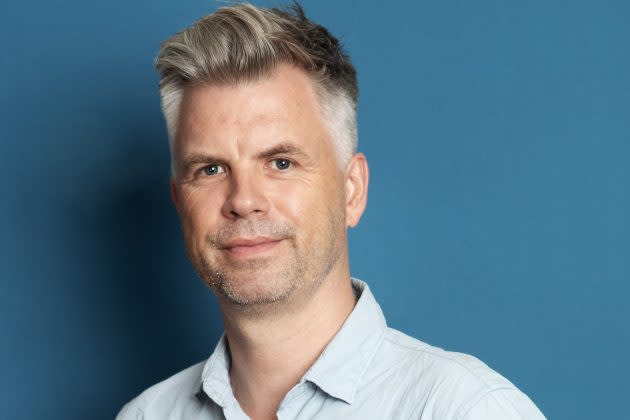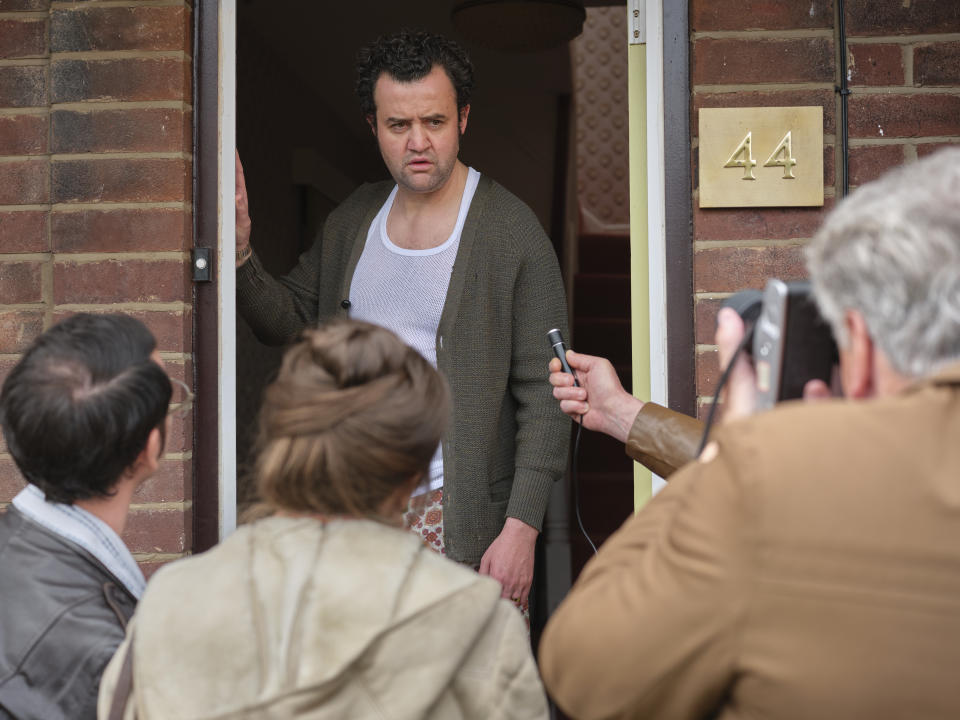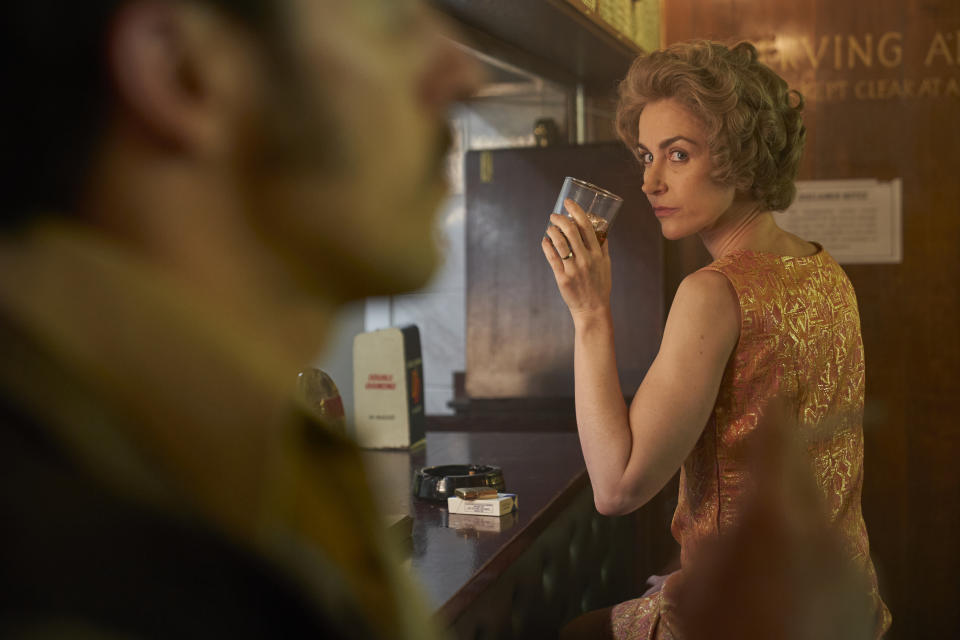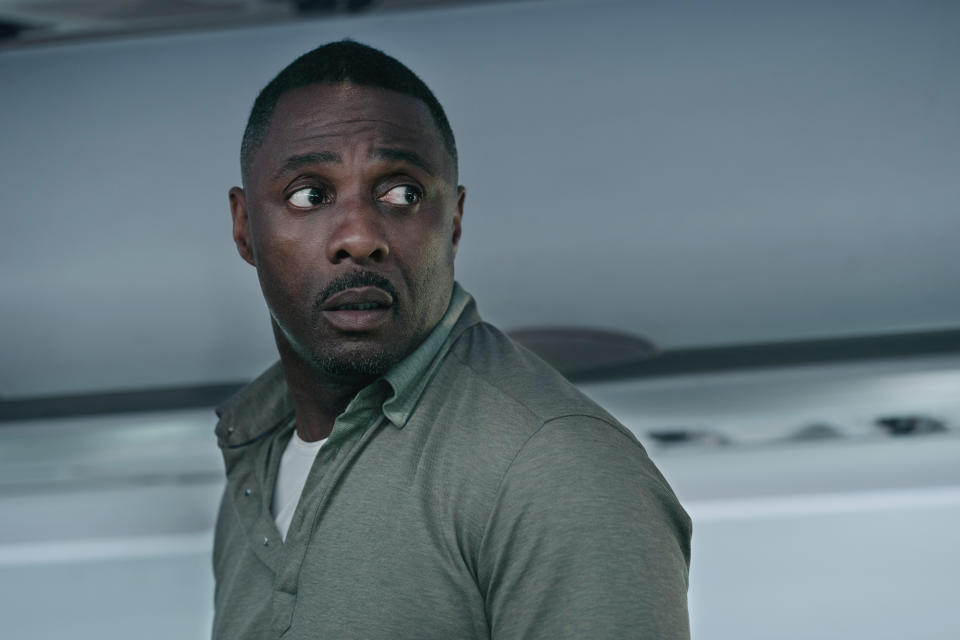The George Kay Effect: The ‘Lupin’ & ‘Hijack’ Scribe On ITV’s ‘The Long Shadow’ & His Support For The U.S. Strikes – Mipcom Cannes Special

George Kay looks conflicted. Speaking to Deadline before the resolution of the writers strike, the British WGA member had put down his pen on an Amazon Studios movie project and ducked a U.S. publicity round for his Apple TV+ series Hijack. But it’s fair to say that the strikes coincided with Kay having a serious moment.
Not unlike the protagonist in Hijack, Idris Elba’s brooding professional negotiator Sam Nelson, Kay has spent years maneuvering his way between three complex projects for Apple, Netflix and ITV/Sundance—only for them all to launch within four months of each other.
More from Deadline
Just like Nelson’s character in Hijack—“He gets brought in, by big companies…when it all kicks off,” Nelson’s wife explains to a police officer in the show—Kay’s the man you bring in when you want to deliver a character-led thriller that will keep viewers hooked over several episodes.
As well as holding a plane hostage for Apple, he is the co-creator of Lupin, Netflix’s smash-hit French heist drama, which returned for its third season on October 5. Ten days earlier, ITV premiered Kay’s limited series The Long Shadow, examining the fallout from the crimes of the so-called “Yorkshire Ripper,” Peter Sutcliffe.
Kay fully supported the strikes but is a champion of the flourishing scene of writers in the UK and Europe, pointing out that The Long Shadow would not have been impacted by industrial action. “The WGA are wonderful, but that’s an American union, it’s not the whole world,” he says.

It’s the reason why he was happy to sit down with Deadline for this interview. That and Kay has managed to surface for air after a manic period of writing. “I was doing those three series at the same time,” he says. “That’s working full throttle for probably about two years, so I’ve been grateful for a bit of calm.”
Kay started out in documentaries as a development specialist. A self-proclaimed ideas man, he is credited with co-creating The Choir, the BAFTA-winning BBC television show in which presenter Gareth Malone transforms a group of novice singers into a life-affirming choral group.
“The ultimate development person can tell you, moment by moment, how a TV show might go…and let other people make it,” he says. His taste for constructing the drama in documentaries also manifested itself in side-hustle writing projects, which later became a full-time endeavor.
Kay’s early credits include an episode of The Hour, the BBC’s beloved Cold War-era drama about a British news show, and Sky’s adaptation of The Tunnel, starring Clémence Poésy. In 2016, he created the BBC’s bachelor-party-gone-wrong series Stag with his Hijack wing-man Jim Field Smith, before moving on to the first season of Killing Eve, on which he collaborated with Phoebe Waller-Bridge.
Kay and Field Smith, who met at college, also created Criminal, the Netflix anthology drama in which detectives interrogate suspects within the confines of a police interview suite. In a nod to his unscripted days, Kay jokes Criminal is not dissimilar to Total Wipeout, the anarchic physical gameshow. “It’s a format where you build a set and then invite different territories to come and make their own version of the show,” he says. The series was remade in Spain, France and Germany.
Kay’s credits suggest a preoccupation with crime—an observation he embraces because it means writing about “ordinary people doing extraordinary things,” for good or evil. Reflecting on why TV is obsessed with true crime stories, he says: “They tend to revolve around dynamics that the audience can relate to. They happen in precincts audiences recognize.”
Sutcliffe’s story
He was drawn to the story of Sutcliffe, not because of the killer himself, but because of how his actions had a profound impact on a community in the north of England. Convicted of murdering 13 women, Sutcliffe’s crimes were beyond barbaric, but in The Long Shadow, he does not appear on screen until the final episode and his acts of brutality are never depicted. The closest the audience comes is a single-hander scene in which an emergency services operator, played by Years and Years’ Ruth Madeley, takes a call from Marcella Claxton (Jasmine Lee-Jones), who has just been attacked by Sutcliffe.
It feels like the antithesis of Netflix’s Dahmer, which was criticized for closely framing the killer and obsessing over the gruesome details of his crimes. “There is a risk that we glamorize these people,” Kay says when presented with the Dahmer contrast. “I was conscious of not wanting to glamorize Sutcliffe in any way… I wouldn’t want to make a serial killer my protagonist because I don’t necessarily empathize or understand their thinking.”
The Long Shadow, produced by New Pictures in association with All3Media International, has an ensemble cast spotlighting the police who hunted down Sutcliffe and the women who were his victims. Emily Jackson, a mother who turned to sex work when her family faced financial strife, was Kay’s route into the seven-part series. “In another drama, you’d start with the discovery of Emily Jackson’s body, but I spent the whole episode getting to know her,” Kay says. “That shows the ambition in terms of the pacing and the size of it.”

Jackson is played by Happy Valley star Katherine Kelly, who is compelling in what is a small role for an established British TV star. Even though many of the cast only appear in one or two episodes, each actor was given the full seven scripts to understand their place in the series. “This is the long shadow of these crimes,” Kay says. “It goes into the capillaries of society. If it wasn’t so glib, we’d refer to it as a ‘Yorkshire Ripple.’ It’s such a silly phrase, but that’s exactly what it was. It was part of the north of England and affected everyone’s lives.”
Having grown up in Berkshire, an English county west of London, Kay saw Britain’s north/south cultural divide as an obstacle he had to overcome in writing the series. He visited the community in Chapeltown, Leeds, on several occasions to interview people. New Pictures received some “gentle pushback” about the series from family members of the victims, the writer adds, some of whom were wary of being associated with Sutcliffe’s crimes.
Kay remembers one interaction with Richard McCann, the son of victim Wilma McCann. Richard took issue with the show’s original working title, The Yorkshire Ripper, saying those linked to the murders were not comfortable with the Sutcliffe moniker. “We don’t like that verb,” he told Kay, saying it had become a “dark brand name” for the killer.
“We said he was completely right,” Kay says. “We needed to change that, react, learn, and grow in our creative process. So, we changed it within a month of announcing. I want to be really open about how writers and TV makers need to change and not claim to have everything perfectly in order. If you’re researching properly, you’re learning.”

Kay says there are dangers in factual dramas capturing events that have just happened. Asked about recent political series in the UK, including Sky’s Boris Johnson drama This England and Banijay’s plans to examine Liz Truss’ tenure as Prime Minister, he believes these events don’t yet have their full historical context. “I think there’s a real thing about going too quickly,” he says, adding that he needs “perspective” in his work, or it can lead to “odd blind spots.”
Kay is a morning writer, usually getting to his desk for 6 a.m. when he enjoys a productive “golden hour” before his house wakes up. He continues writing throughout the morning, leaving afternoons for read-throughs and meetings. He was writing The Long Shadow and Hijack in parallel, only separating the time he spent on each script with a sandwich or a swim. Kay enjoyed switching into a “completely different gear” on Hijack, which is a fictional series with a “muscular” script, involving action scene descriptions in the tight confines of a plane.
Kay says he was “Idris aware” as he wrote the first episode after Jay Hunt, Apple TV+’s Creative Director in Europe, floated Elba for the lead role. He pared back his script when it came to filming because Elba was able to capture Sam Nelson plotting his way out of the hijack in a single expression. “You don’t want everyone chatting too much [on the plane], because obviously you will reduce the fear,” he says.
All the signs are that Hijack performed well for Apple, which may have been helped by the show’s weekly release strategy. Kay says having to wait for fresh episodes is a “forgotten treat” in television and is something writers can embrace if they are given notice by streaming services.

“Provided you know in advance how you’re going to be put out, I think that’s really helpful for writers,” he explains. “We knew that we were not going to go out in one blob for Hijack, so I was able to factor that into how it was written. You know that you’re going to have a bit of a break, so you lean into a cliff-hanger a bit more here and there.”
Hijack was a limited series, but Kay says there is the potential for the drama to return for a second season. It is unlikely he will be involved, however, given he is under contract with Netflix. He signed up for Season 1 of Hijack and The Long Shadow before agreeing to his deal with Netflix, which allows him to range across different projects in Europe. “I don’t think it’s healthy, necessarily, for a single commissioner to be trapped with one writer because you want to have more flexibility than that,” he says of his overall deal.
After a frenetic spell of writing three projects, Kay is grateful for a quieter period of development work. But not unlike many writers, he will welcome a more fulsome return to the keyboard now that the strike is resolved. “We all want to get started again on something else sooner or later,” he says. “So yeah, I’m itching to do the next thing.”
His recent purple patch suggests that crime fans will be waiting and eagerly watching.
Best of Deadline
2023 Premiere Dates For New & Returning Series On Broadcast, Cable & Streaming
2023-24 Awards Season Calendar - Dates For Oscars, Emmys, Grammys, Tonys, Guilds & More
Sign up for Deadline's Newsletter. For the latest news, follow us on Facebook, Twitter, and Instagram.


